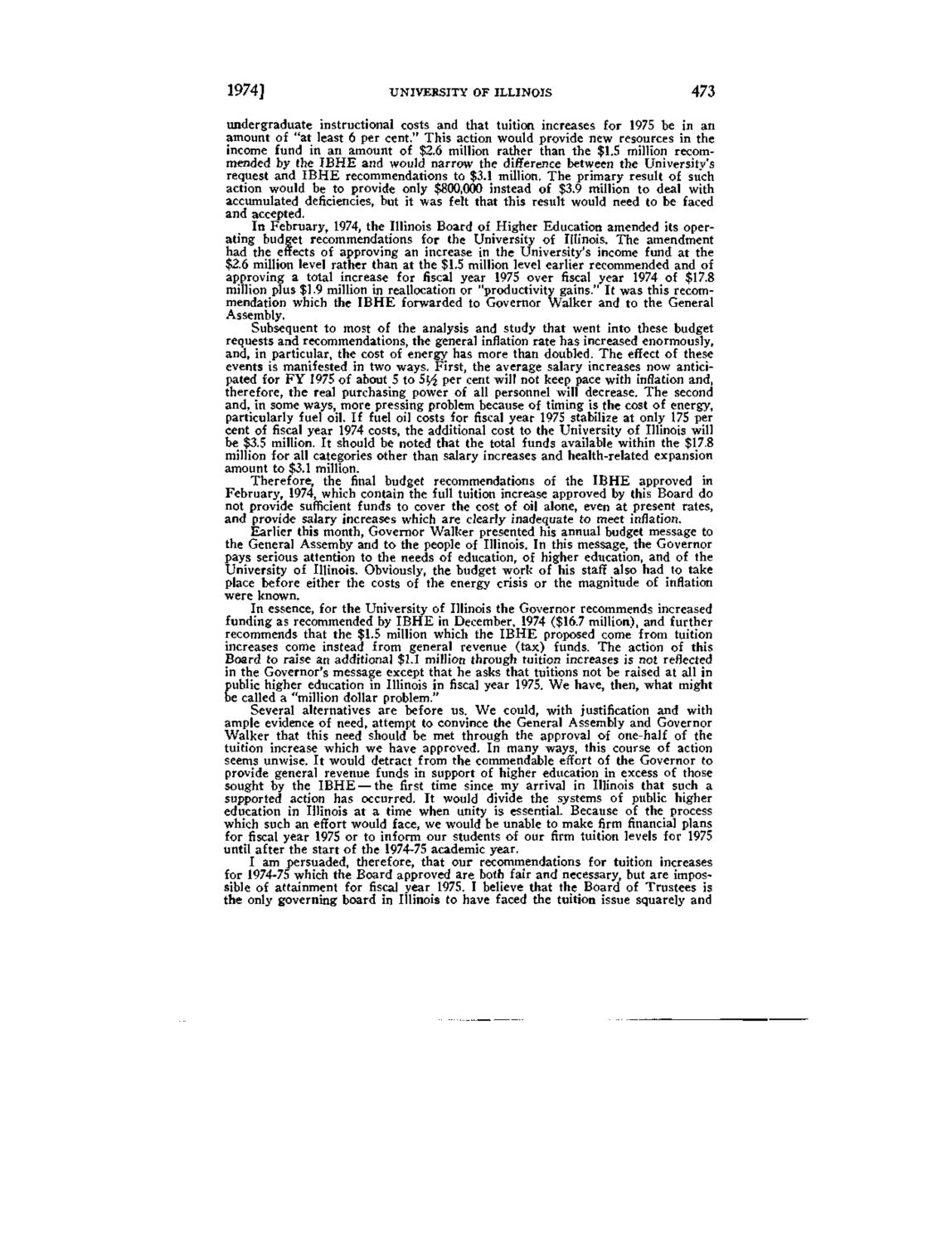| |
| |
Caption: Board of Trustees Minutes - 1974
This is a reduced-resolution page image for fast online browsing.

EXTRACTED TEXT FROM PAGE:
1974] UNIVERSITY OF ILLINOIS 473 undergraduate instructional costs and that tuition increases for 1975 be in an amount of "at least 6 per cent," This action would provide new resources in the income fund in an amount of $2,6 million rather than the $1.5 million recommended by the IBHE and would narrow the difference between the University's request and IBHE recommendations to $3.1 million. The primary result of such action would be to provide only $800,000 instead of $3.9 million to deal with accumulated deficiencies, but it was felt that this result would need to be faced and accepted. In February, 1974, the Illinois Board of Higher Education amended its operating budget recommendations for the University of Illinois. The amendment had the effects of approving an increase in the University's income fund at the $2.6 million level rather than at the $1.5 million level earlier recommended and of approving a total increase for fiscal year 1975 over fiscal year 1974 of $17.8 million plus $1.9 million in reallocation or "productivity gains." It was this recommendation which the IBHE forwarded to Governor Walker and to the General Assembly. Subsequent to most of the analysis and study that went into these budget requests and recommendations, the general inflation rate has increased enormously, and, in particular, the cost of energy has more than doubled. The effect of these events is manifested in two ways. First, the average salary increases now anticipated for FY 1975 of about 5 to Si/z per cent will not keep pace with inflation and, therefore, the real purchasing power of all personnel will decrease. The second and, in some ways, more pressing problem because of timing is the cost of energy, particularly fuel oil. If fuel oil costs for fiscal year 1975 stabilize at only 175 per cent of fiscal year 1974 costs, the additional cost to the University of Illinois will be $3.5 million. It should be noted that the total funds available within the $17.8 million for all categories other than salary increases and health-related expansion amount to $3.1 million. Therefore, the final budget recommendations of the IBHE approved in February, 1974, which contain the full tuition increase approved by this Board do not provide sufficient funds to cover the cost of oil alone, even at present rates, and provide salary increases which are clearly inadequate to meet inflation. Earlier this month, Governor Walker presented his annual budget message to the General Assemby and to the people of Illinois. In this message, the Governor pays serious attention to the needs of education, of higher education, and of the University of Illinois. Obviously, the budget work of his staff also h a d t o take place before either the costs of the energy crisis or the magnitude of inflation were known. In essence, for the University of Illinois the Governor recommends increased funding as recommended by IBHE in December, 1974 ($16.7 million), and further recommends that the $1.5 million which the IBHE proposed come from tuition increases come instead from general revenue (tax) funds. The action of this Board to raise an additional $1.1 million through tuition increases is not reflected in the Governor's message except that he asks that tuitions not be raised at all in public higher education in Illinois in fiscal year 1975. We have, then, what might be called a "million dollar problem." Several alternatives are before us. We could, with justification and with ample evidence of need, attempt to convince the General Assembly and Governor Walker that this need should be met through the approval of one-half of the tuition increase which we have approved. In many ways, this course of action seems unwise. It would detract from the commendable effort of the Governor to provide general revenue funds in support of higher education in excess of those sought by the IBHE — the first time since my arrival in Illinois that such a supported action has occurred. It would divide the systems of public higher education in Illinois at a time when unity is essential. Because of the process which such an effort would face, we would be unable to make firm financial plans for fiscal year 1975 or to inform our students of our firm tuition levels for 1975 until after the start of the 1974-75 academic year, I am persuaded, therefore, that our recommendations for tuition increases for 1974-75 which the Board approved are both fair and necessary, but are impossible of attainment for fiscal year_ 1975. I believe that the_ Board of Trustees is the only governing board in Illinois to have faced the tuition issue squarely and
| |